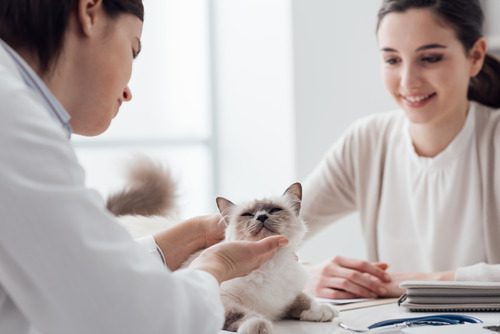Is Your Cat Getting Enough Vet Care?
Cats are experts at hiding discomfort, which can make it hard for pet owners to know when something is wrong. Regular veterinary care helps uncover health concerns before they become serious and supports your cat’s overall comfort and quality of life. Many owners wonder how often to take your cat to the veterinarian for exams, vaccines, and preventive care. The answer depends on your cat’s age, lifestyle, and medical history. In this blog, we’ll explore the recommended visit schedules, what to expect during appointments, and why consistent care is key for your feline friend’s health.

Why Regular Veterinary Visits Matter
Cats often seem independent and resilient, but they still need consistent health monitoring. Unlike dogs, cats can mask signs of illness until the condition progresses. This makes it especially important for owners to understand how often to take your cat to the veterinarian to protect their pet’s long-term health.
Veterinary visits provide an opportunity for thorough physical exams, vaccinations, and diagnostic screenings. These appointments also help your veterinarian establish a baseline of your cat’s health, making it easier to detect subtle changes over time. Routine visits give you the chance to ask questions about nutrition, behavior, and daily care, while allowing your veterinarian to address any concerns early.
How Often to Take a Kitten to the Veterinarian
Kittens grow rapidly and need frequent checkups to set a strong foundation for adulthood. Owners should understand how often to take your cat to the veterinarian during these early months because care schedules differ from those of adult cats.
Vaccine and Exam Schedule for Kittens
- Every 3–4 weeks from 6 to 16 weeks old: Kittens typically receive a series of vaccinations, parasite screenings, and wellness exams.
- Spay/neuter consultation: Your veterinarian may recommend surgery around 5–6 months of age.
- Nutritional guidance: Visits include discussions about diet, growth milestones, and weight management.
These early visits ensure kittens develop a healthy immune system and adapt to the veterinary experience positively.
How Often to Take an Adult Cat to the Veterinarian
Once cats reach adulthood, the schedule for how often to take your cat to the veterinarian usually changes. Healthy adult cats benefit from annual wellness exams to monitor their overall condition.
What Happens During Annual Exams
At these visits, your veterinarian may:
- Perform a full physical exam, checking teeth, ears, eyes, heart, and lungs.
- Administer core and lifestyle-based vaccines.
- Recommend parasite prevention tailored to your cat’s habits.
- Discuss dental health, nutrition, and weight control.
Even if your cat appears healthy, yearly appointments provide reassurance and early intervention if hidden conditions are detected.
How Often to Take a Senior Cat to the Veterinarian
Senior cats, typically age 7 and older, require more frequent monitoring. At this stage, knowing how often to take your cat to the veterinarian becomes even more important.
Biannual Exams for Senior Cats
Veterinarians often recommend checkups every six months for aging cats. These appointments can include:
- Bloodwork and urinalysis to screen for kidney disease, diabetes, or thyroid conditions.
- Weight checks to watch for sudden loss or gain.
- Joint and mobility assessments.
- Dental evaluations to address gum disease or tooth loss.
Because older cats face a higher risk of chronic conditions, consistent visits allow for early detection and management of age-related health changes.
Special Considerations That Affect Visit Frequency
While general guidelines help, the answer to how often to take your cat to the veterinarian also depends on lifestyle and medical needs.
Indoor vs. Outdoor Cats
Indoor cats may need fewer lifestyle-based vaccines but still require annual exams. Outdoor cats face higher risks of parasites, injuries, and infectious diseases, often needing more frequent visits and preventive measures.
Cats with Chronic Conditions
Cats diagnosed with diabetes, kidney disease, heart problems, or other chronic illnesses often need checkups every 2–3 months. Regular monitoring helps veterinarians adjust treatment plans as needed.
What Pet Owners Can Expect at Each Stage of Care
Understanding how often to take your cat to the veterinarian is easier when you know what each stage involves.
Kitten Care
Frequent visits help establish immunity, monitor growth, and prepare for adulthood.
Adult Cat Care
Annual exams maintain wellness, catch dental issues, and provide preventive treatments.
Senior Cat Care
More frequent visits identify early signs of age-related illnesses and allow timely interventions. By following these visit schedules, you ensure your cat receives care tailored to their life stage and health status.
How Regular Veterinary Care Benefits You and Your Cat
Knowing how often to take your cat to the veterinarian doesn’t just support your pet’s health, it gives you peace of mind. Veterinary visits strengthen the bond between owner and cat by addressing questions and providing reassurance. They also reduce the likelihood of costly emergencies by detecting problems before they become urgent. Cats thrive when preventive care is consistent. Establishing a relationship with a trusted veterinary team, like our team at Levan Road Veterinary Hospital also means you’ll have support when unexpected issues arise.
Schedule Your Cat’s Next Appointment at Levan Road
Now that you have a better understanding of how often to take your cat to the veterinarian, the next step is to schedule your cat’s visit. Whether you have a playful kitten, an active adult, or a wise senior, regular veterinary care helps safeguard their health at every stage of life. Call Levan Road Veterinary Hospital in Livonia, MI at (734) 464-6281 today to book your cat’s appointment. Your cat deserves consistent care and we’re here to provide it.

